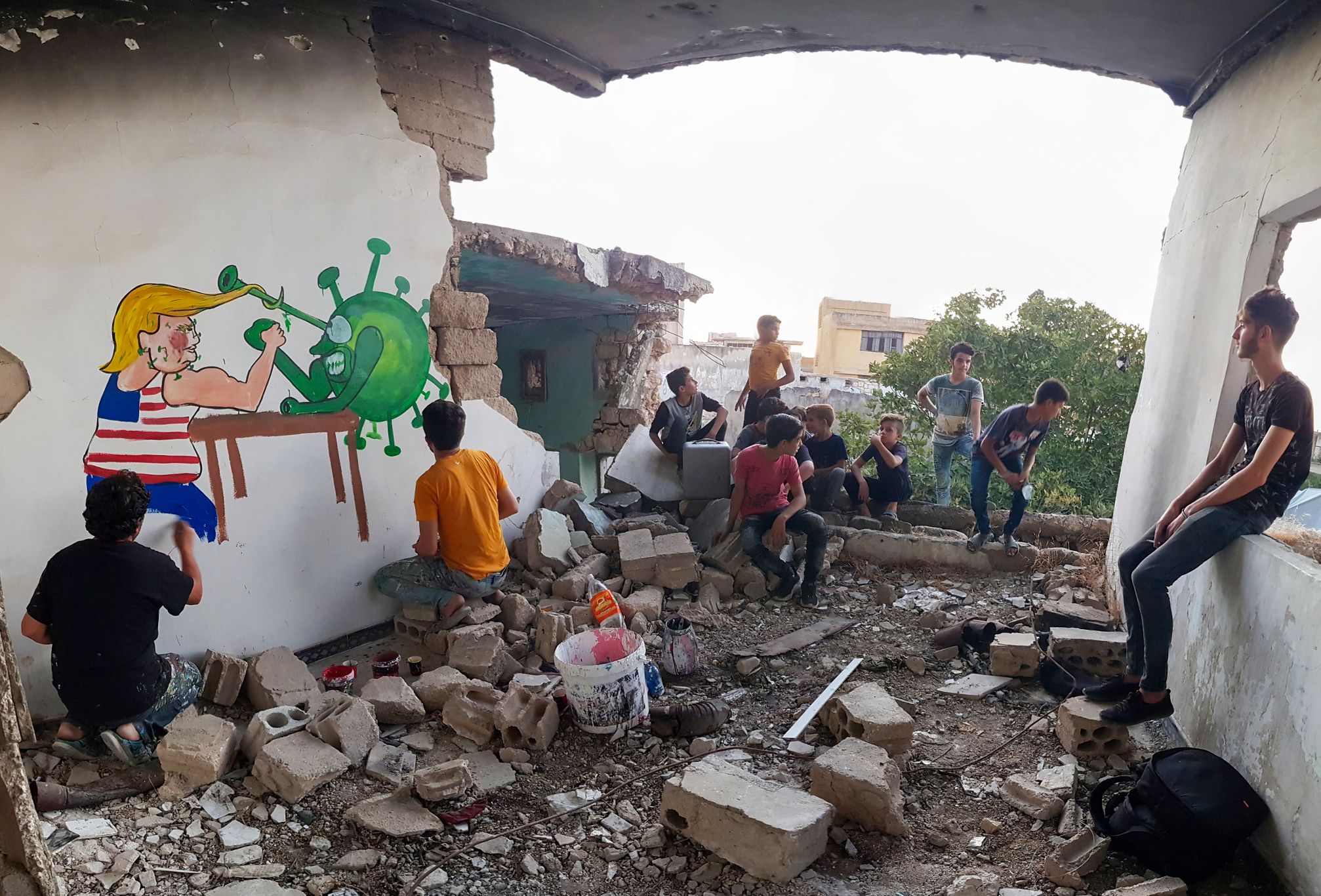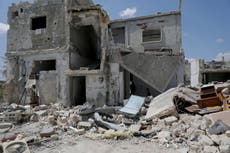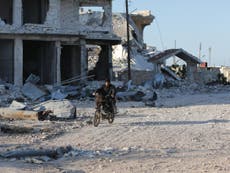The next Gaza Strip? Daily battle of survival for those left in Idlib
Idlib is one of the last remaining opposition strongholds in Syria

Your support helps us to tell the story
From reproductive rights to climate change to Big Tech, The Independent is on the ground when the story is developing. Whether it's investigating the financials of Elon Musk's pro-Trump PAC or producing our latest documentary, 'The A Word', which shines a light on the American women fighting for reproductive rights, we know how important it is to parse out the facts from the messaging.
At such a critical moment in US history, we need reporters on the ground. Your donation allows us to keep sending journalists to speak to both sides of the story.
The Independent is trusted by Americans across the entire political spectrum. And unlike many other quality news outlets, we choose not to lock Americans out of our reporting and analysis with paywalls. We believe quality journalism should be available to everyone, paid for by those who can afford it.
Your support makes all the difference.“Many relatives of mine were living in camps near the border with Turkey,” says Huda Husein, a 25-year-old teacher living in the rebel-held enclave of Idlib in northwest Syria. “But last month they returned home [to the cities and villages] because they prefer dying under an airstrike to dying in the camps.” A cousin told her that “we are just fleeing from danger to danger”, explaining that the misery of trying to survive in cramped tents was worse than bombardment by Russia and Syrian government forces.
The breaking point for the 2.6 million Syrians hostile to the president, Bashar al-Assad, who had taken refuge in Idlib, came this summer. The US introduced devastating economic sanctions on Syria which combined with the onset of the coronavirus epidemic to turn a crisis into a calamity. Together, the sanctions and the disease hit a population already short of food, shelter and medical care. All Syria is suffering badly, but Huda says that “Idlib is the most miserable part of the country” and is suffering the worst.
The Idlib opposition enclave is described by Fabrice Balanche, an expert on northern Syria at the Washington Institute for Near East Policy, as the “next Gaza Strip”. Wrecked by bombing and artillery fire, the pocket is only a third of the size it was three years ago following a series of Syrian government advances.
Most of its inhabitants had fled to a very small area along the Turkish border to escape the bombs and shells and to be close to the distribution points for foreign aid. Some, like Huda Husein (not her real name), stayed further south in and around Idlib city where living conditions are better, but the threat of war is worse.
In an interview with The Independent, she paints a graphic picture of the mood of despair that is sweeping through the last opposition stronghold, aside from the Kurdish-held region in north east Syria. She describes how her aunt fled Idlib city a year-and-a-half ago to live in a camp for displaced persons after her neighbour’s house was partially destroyed in an airstrike. The aunt has now moved back, saying that “dying in a minute under a Russian airstrike is much better than dying from coronavirus like a dog”.
Huda taught for two years in different camps, which she believes number 1,200, where there is little health care and no room for social distancing. “I have seen tents where fifteen people were sleeping head-to-toe like prisoners in Palmyra [a notorious government prison].” Even more shocking for her was the number of families without even a tent to sleep in. “They just use carpets and mats to make a fragile shelter,” she says.
Deprivation in Idlib was already bad after nine years of civil war during which 1.3 million displaced Syrians, in addition to the existing population, crowded into an ever-shrinking area. It was difficult to see how life could get any worse, but two events this summer ensured that they did just that. The first was the new American sanctions – called the Syria Caesar Civilian Protection Act – signed into law by president Donald Trump last year and implemented on 17 June this year. Supposedly intended to deter Assad from repressing ordinary Syrians, it targeted with severe penalties any foreign individual or business doing business with Syria.
The measures turned all Syrians, pro and anti-Assad, into economic pariahs subjected to a crippling economic siege. The embargo led to the collapse of the Syrian currency and a steep rise in the price of basic foodstuffs, with wheat, rice and bulgur tripling in price. This happened in a country where the World Food Programme said in June that “famine could very well be knocking at the door".
The new law was given a humanitarian guise by being named after the alias of the Syrian government photographer who had taken pictures of the bodies of tens of thousands of Syrians killed by the regime (Syrian officials deny the accusation). A more likely and less altruistic motive is that Washington wants to deny Russia, Iran and Assad an outright victory in the Syrian conflict by ensuring that the country will not see a recovery from the present level of devastation, even if Assad stays in control.
As with the UN sanctions against Saddam Hussein thirty years ago, the Syrian leadership is unlikely to be seriously damaged by enhanced sanctions since the burden will fall on the poor and the powerless. ‘Political elites are typically well placed to avoid sanctions’ impact or even profit from the scarcity they create, while the real harm hits the broad majority of the population,’ says the Brussels-based International Crisis Group.
This is certainly what is happening in Syria with the worst hit being war-shattered Idlib. As the Syrian pound collapsed, the local Government of Salvation (dominated by the jihadist Hayat Tahrir al-Sham) switched to the Turkish lira but the already inadequate standard of living still plummeted. “My own salary fell from the equivalent of $160 to $100 a month,” says Huda, “while my brother, who is a construction worker, saw his pay fall from $6 to $3 a day”. At the same time, prices soared so even filling the house water tank with drinkable water cost too much. Her account confirms the ICG’s conclusion that sanctions intended to protect Syrian civilians from the regime “may end up hurting them instead”.
Within a few weeks of the Caesar Act, a second disaster struck people in Idlib. The coronavirus epidemic arrived late there because of the enclave’s isolation, and was brought in, locals believe, by Turkish doctors and nurses (this is unlikely since it also began spreading in the rest of Syria at this time). A month ago, Huda’s brother contracted the virus and stayed at home for three days. “He didn’t have medicine, just some paracetamol to kill the pain and to allow him to sleep,” she says. A doctor reached by phone told him to quarantine for fourteen days, but he decided that he had to go back to work, telling his family that “war is waged by humans but coronavirus came from God and nobody can stop it.” Huda hopes that, as a construction worker, he will have the physical strength to survive.
Even if he had sought further medical help, there would have been little to give. A friend in the Health Authority in Idlib told Huda that in the whole enclave there are only about 3,000 hospital beds for almost three million people. Many hospitals had been destroyed or damaged by Russian and Syrian government bombing and artillery fire. At first’ she says, people tried to self-isolate, but over-crowding made this impossible even after people knew they were infected.In most of Syria, the shooting war is over as Assad’s forces recaptured opposition centres, but the fighting continues in Idlib as well as in northern Aleppo province that has been occupied by Turkish forces.
The Syrian government wants to keep up the bombing to make sure that the cities and towns of Idlib remain largely uninhabited and do not become a viable opposition hub. Its offensives since 2017 have reduced the pocket to a third of its original size or 3,000 square kilometres. Yet even this small area is unevenly inhabited with 2 million in the camp strung along the Syrian side of the Turkish border which is outside artillery range and is little bombed. Some of Huda’s relatives may have returned to their homes further south, but most people have little confidence in the ceasefire agreed between Russia and Turkey on 5 March. A resumption of a full scale Syrian government offensive depends on decisions reached in Moscow and Ankara.
In most of Syria, the shooting war is over as Assad’s forces recaptured opposition centres, but the fighting continues in Idlib as well as in northern Aleppo province that has been occupied by Turkish forces. The Syrian government wants to keep up the bombing to make sure that the cities and towns of Idlib remain largely uninhabited and do not become a viable opposition hub. Its offensives since 2017 have reduced the pocket to a third of its original size or 3,000 square kilometres.
Yet even this small area is unevenly inhabited with 2 million in the camp strung along the Syrian side of the Turkish border which is outside artillery range and is little bombed.
Some of Huda’s relatives may have returned to their homes further south, but most people have little confidence in the ceasefire agreed between Russia and Turkey on 5 March. A resumption of a full scale Syrian government offensive depends on decisions reached in Moscow and Ankara.



Join our commenting forum
Join thought-provoking conversations, follow other Independent readers and see their replies
Comments